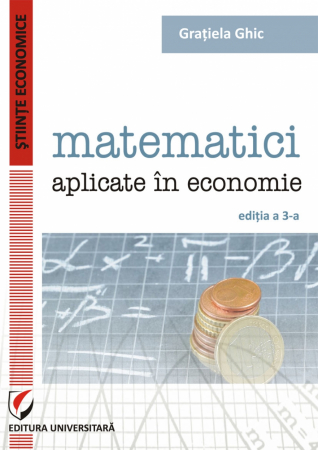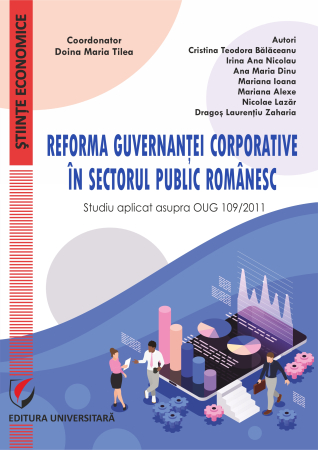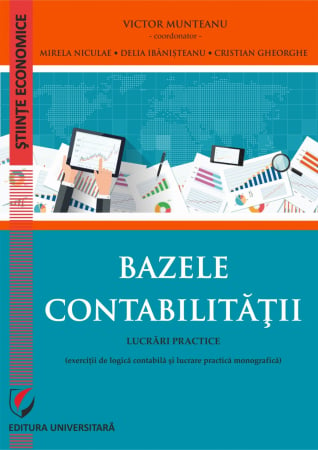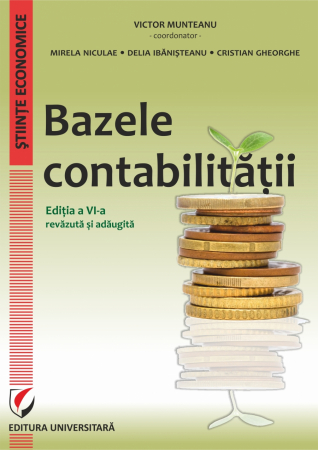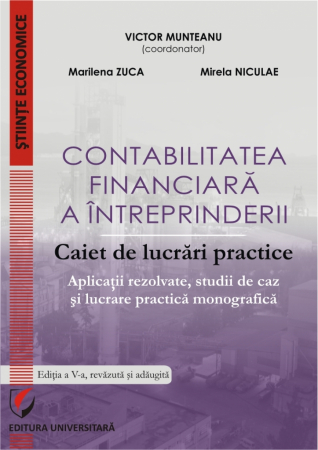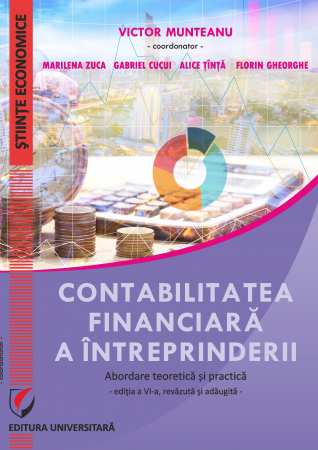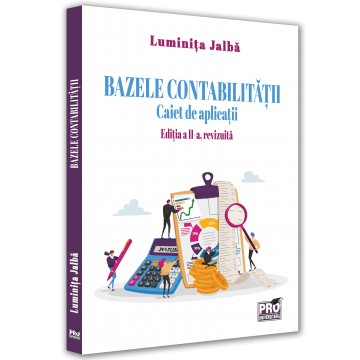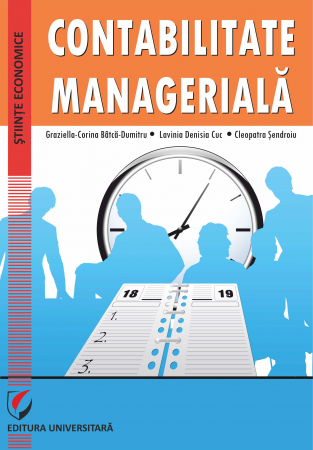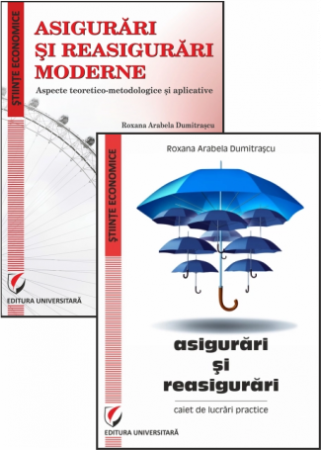Manuscript proposals: [email protected] / 0745 204 115 //// Tracking orders Individuals / Sales: 0745 200 357 / Orders Legal entities: 0721 722 783
6359.png) The Public Budget. Elements of taxation and coordination of economic policies - Alina-Georgiana Solomon
The Public Budget. Elements of taxation and coordination of economic policies - Alina-Georgiana Solomon
6359.png)
ISBN: 978-606-28-0346-9
DOI: 10.5682/ 9786062803469
Publisher year: 2015
Edition: I
Pages: 172
Publisher: Editura Universitară
Author: Alina-Georgiana Solomon
Product Code:
9786062803469
Do you need help?
0745 200 357
- Description
- Download (1)
- Authors
- Content
- More details
- Reviews (0)
Elaborated and structured in a coherent manner, the paper “Public budget. Elements of taxation and coordination of economic policies ", approaches the fiscal and budgetary issues through the prism of the components of the fiscal-budgetary system and of the interdependence relations between them. The entire scientific approach, managing to successfully combine the application of several fields, such as: philosophy, economics, mathematics or statistics. The vast spectrum of the field approached in this paper, allowed a structure centered on four chapters, as follows:
The first chapter, "Taxation and the public budget in economic thinking", captures the main theoretical contributions of the doctrines on taxation and the public budget. At the same time, in the second part of this chapter are described some theoretical models for analyzing the general economic balance.
The second chapter, "Considerations on taxation and the public budget", aims to clarify the concepts specific to the fiscal-budgetary field. For this purpose, we considered useful the presentation of the main definitions, principles and characteristics attributed to taxation and budget by the economic literature. Special attention is paid to Romania's budget process at the end of this chapter.
Chapter three of the paper, "Romania's fiscal and budgetary system", includes an analysis of the functioning of the economy, through the system of public revenues and expenditures, the correlations and interactions between economic policies.
The presentation and description of the unitary budget system at national level being made separately during an entire subchapter. Guided by the words of Jan Timbergen, according to which "in order to achieve its goal, an economic policy must have as many tools as it has objectives", chapter four entitled "Harmonization and coordination of fiscal policy". Essential requirements for Romania's integration into the euro area ", is focused on the asymmetric impact generated by the existence of 28 different fiscal systems in the European Union. In this context, in the content of this chapter are treated: the legal aspects that regulate the monetary and fiscal-budgetary activity of the member states; how to apply the fiscal rules; the results of the implementation of economic policies and their fiscal implications on Romania.
Through the complexity of the content and the approached topic, this specialized work contributes to the shaping of a global vision on the fiscal-budgetary field, offering information necessary to deepen the subsequent researches.
The first chapter, "Taxation and the public budget in economic thinking", captures the main theoretical contributions of the doctrines on taxation and the public budget. At the same time, in the second part of this chapter are described some theoretical models for analyzing the general economic balance.
The second chapter, "Considerations on taxation and the public budget", aims to clarify the concepts specific to the fiscal-budgetary field. For this purpose, we considered useful the presentation of the main definitions, principles and characteristics attributed to taxation and budget by the economic literature. Special attention is paid to Romania's budget process at the end of this chapter.
Chapter three of the paper, "Romania's fiscal and budgetary system", includes an analysis of the functioning of the economy, through the system of public revenues and expenditures, the correlations and interactions between economic policies.
The presentation and description of the unitary budget system at national level being made separately during an entire subchapter. Guided by the words of Jan Timbergen, according to which "in order to achieve its goal, an economic policy must have as many tools as it has objectives", chapter four entitled "Harmonization and coordination of fiscal policy". Essential requirements for Romania's integration into the euro area ", is focused on the asymmetric impact generated by the existence of 28 different fiscal systems in the European Union. In this context, in the content of this chapter are treated: the legal aspects that regulate the monetary and fiscal-budgetary activity of the member states; how to apply the fiscal rules; the results of the implementation of economic policies and their fiscal implications on Romania.
Through the complexity of the content and the approached topic, this specialized work contributes to the shaping of a global vision on the fiscal-budgetary field, offering information necessary to deepen the subsequent researches.
-
BUGETUL PUBLIC. ELEMENTE DE FISCALITATE SI COORDONARE A POLITICILOR ECONOMICE
Download
ALINA-GEORGIANA SOLOMON
Abbreviations / 7
Introduction / 9
1. Taxation and the public budget in economic thinking / 12
1.1. The evolution of taxation and public budget under the auspices of economic doctrine / 12
1.2. Landmarks of the theoretical models regarding the general economic balance / 19
2. Considerations regarding the taxation and the public budget / 26
2.1. The concept of taxation - definition, principles and characteristics / 26
2.2. Public budget - definition, principles and characteristics / 32
2.3. The budgetary process in Romania / 37
3. The fiscal and budgetary system of Romania / 43
3.1. Content and structure of the fiscal-budgetary system / 43
3.1.1. Public revenues / 49
3.1.2. Public expenditure / 61
3.2. Budget deficit / 70
3.3. Unitary budget system at national level / 78
4. Harmonization and coordination of fiscal-budgetary policy. Essential requirements for Romania's integration in the euro area / 98
4.1. Elements regarding the harmonization and coordination of the fiscal - budgetary policy of Romania / 98
4.1.1. Fiscal competition: dimensions and effects on the fiscal - budgetary system in Romania / 124
4.2. Analysis of economic policies in the euro area / 128
4.2.1. Characteristics of the main economic policies of the euro area / 128
4.2.2. Fiscal and budgetary implications of euro area economic policies on Romania / 141
4.3. Efficiency of harmonization and coordination of fiscal - budgetary policy in achieving economic convergence / 147
Bibliography / 161
Introduction / 9
1. Taxation and the public budget in economic thinking / 12
1.1. The evolution of taxation and public budget under the auspices of economic doctrine / 12
1.2. Landmarks of the theoretical models regarding the general economic balance / 19
2. Considerations regarding the taxation and the public budget / 26
2.1. The concept of taxation - definition, principles and characteristics / 26
2.2. Public budget - definition, principles and characteristics / 32
2.3. The budgetary process in Romania / 37
3. The fiscal and budgetary system of Romania / 43
3.1. Content and structure of the fiscal-budgetary system / 43
3.1.1. Public revenues / 49
3.1.2. Public expenditure / 61
3.2. Budget deficit / 70
3.3. Unitary budget system at national level / 78
4. Harmonization and coordination of fiscal-budgetary policy. Essential requirements for Romania's integration in the euro area / 98
4.1. Elements regarding the harmonization and coordination of the fiscal - budgetary policy of Romania / 98
4.1.1. Fiscal competition: dimensions and effects on the fiscal - budgetary system in Romania / 124
4.2. Analysis of economic policies in the euro area / 128
4.2.1. Characteristics of the main economic policies of the euro area / 128
4.2.2. Fiscal and budgetary implications of euro area economic policies on Romania / 141
4.3. Efficiency of harmonization and coordination of fiscal - budgetary policy in achieving economic convergence / 147
Bibliography / 161
The evolution of the economic process has led to the increase of individual and collective needs, as well as their degree of satisfaction. This conjuncture generated a waste of resources, which made it necessary to find measures to restore the "socio-economic optimum" and resource exploitation. Therefore, the role of the state in the functioning of the economy acquires new dimensions, becoming a fundamental truth.
For decades, the right of the state to collect donations from economic persons and entities on its territory or outside it has been a concern, an object of study for both legal doctrine, for constitutionalists, and for economics. From this perspective, it is important to know the way in which economic thinking has evolved, the results of research conducted in the fiscal-budgetary field, and last but not least the norms of the mechanism of functioning of the current fiscal and budgetary system.
Elaborated and structured in a coherent manner, the paper “Public budget. Elements of taxation and coordination of economic policies ", approaches the fiscal and budgetary issues through the prism of the components of the fiscal-budgetary system and of the interdependence relations between them. The entire scientific approach, managing to successfully combine the application of several fields, such as: philosophy, economics, mathematics or statistics. The vast spectrum of the field approached in this paper, allowed a structure centered on four chapters, as follows:
The first chapter, "Taxation and the public budget in economic thinking", captures the main theoretical contributions of the doctrines on taxation and the public budget. At the same time, in the second part of this chapter are described some theoretical models for analyzing the general economic balance.
The second chapter, "Considerations on taxation and the public budget", aims to clarify the concepts specific to the fiscal-budgetary field. For this purpose, we considered useful the presentation of the main definitions, principles and characteristics attributed to taxation and budget by the economic literature. Special attention is paid to Romania's budget process at the end of this chapter.
Chapter three of the paper, "Romania's fiscal and budgetary system", includes an analysis of the functioning of the economy, through the system of public revenues and expenditures, the correlations and interactions between economic policies.
The presentation and description of the unitary budget system at national level being made separately during an entire subchapter. Guided by the words of Jan Timbergen, according to which "in order to achieve its goal, an economic policy must have as many tools as it has objectives", chapter four entitled "Harmonization and coordination of fiscal policy". Essential requirements for Romania's integration into the euro area ", is focused on the asymmetric impact generated by the existence of 28 different fiscal systems in the European Union. In this context, in the content of this chapter are treated: the legal aspects that regulate the monetary and fiscal-budgetary activity of the member states; how to apply the fiscal rules; the results of the implementation of economic policies and their fiscal implications on Romania.
Through the complexity of the content and the approached topic, this specialized work contributes to the shaping of a global vision on the fiscal-budgetary field, offering information necessary to deepen the subsequent researches.
For decades, the right of the state to collect donations from economic persons and entities on its territory or outside it has been a concern, an object of study for both legal doctrine, for constitutionalists, and for economics. From this perspective, it is important to know the way in which economic thinking has evolved, the results of research conducted in the fiscal-budgetary field, and last but not least the norms of the mechanism of functioning of the current fiscal and budgetary system.
Elaborated and structured in a coherent manner, the paper “Public budget. Elements of taxation and coordination of economic policies ", approaches the fiscal and budgetary issues through the prism of the components of the fiscal-budgetary system and of the interdependence relations between them. The entire scientific approach, managing to successfully combine the application of several fields, such as: philosophy, economics, mathematics or statistics. The vast spectrum of the field approached in this paper, allowed a structure centered on four chapters, as follows:
The first chapter, "Taxation and the public budget in economic thinking", captures the main theoretical contributions of the doctrines on taxation and the public budget. At the same time, in the second part of this chapter are described some theoretical models for analyzing the general economic balance.
The second chapter, "Considerations on taxation and the public budget", aims to clarify the concepts specific to the fiscal-budgetary field. For this purpose, we considered useful the presentation of the main definitions, principles and characteristics attributed to taxation and budget by the economic literature. Special attention is paid to Romania's budget process at the end of this chapter.
Chapter three of the paper, "Romania's fiscal and budgetary system", includes an analysis of the functioning of the economy, through the system of public revenues and expenditures, the correlations and interactions between economic policies.
The presentation and description of the unitary budget system at national level being made separately during an entire subchapter. Guided by the words of Jan Timbergen, according to which "in order to achieve its goal, an economic policy must have as many tools as it has objectives", chapter four entitled "Harmonization and coordination of fiscal policy". Essential requirements for Romania's integration into the euro area ", is focused on the asymmetric impact generated by the existence of 28 different fiscal systems in the European Union. In this context, in the content of this chapter are treated: the legal aspects that regulate the monetary and fiscal-budgetary activity of the member states; how to apply the fiscal rules; the results of the implementation of economic policies and their fiscal implications on Romania.
Through the complexity of the content and the approached topic, this specialized work contributes to the shaping of a global vision on the fiscal-budgetary field, offering information necessary to deepen the subsequent researches.
If you want to express your opinion about this product you can add a review.
write a review

![The Public Budget. Elements of taxation and coordination of economic policies - Alina-Georgiana Solomon [1] The Public Budget. Elements of taxation and coordination of economic policies - Alina-Georgiana Solomon [1]](https://gomagcdn.ro/domains/editurauniversitara.ro/files/product/large/bugetul-public-elemente-de-fiscalitate-si-coordonare-a-politicilor-economice-674-709222.jpg)


